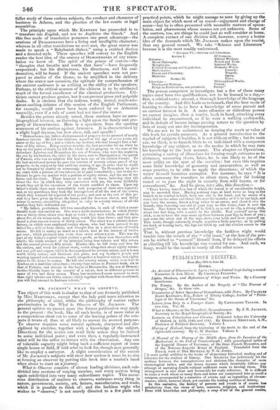MR. JACKSON'S WHAT TO OBSERVE.
THE object of this work is similar to that of one formerly published by Miss MARTINEAU, except that the lady paid more attention to the philosophy of mind, whilst the philosophy of matter rather predominates in the What to Observe of Mr. JACKSON. The general opinion we passed upon the former publication may apply to the present : the book, like all such books, is of more value as a compendious short cut to some of the leading points of the sub- jects it treats of, than at all likely to answer its avowed purpose. To observe requires some natural aptitude, sharpened and dis- ciplined by exercise, together with a knowledge of the subject. Directions for the novice can avail little unless they be limited to some individual point ; and even then, a regularly-instructed mind will be the safest to intrust with the observation. Any one of tolerable sagacity might bring back a sufficient report of some single house or field, if told what to look for, though men generally like to employ a surveyor. A slight consideration of the extent of Mr. JACKSON'S subjects will show how useless it must be to aim at forming an observer by putting this book into a tourist's band when about to start on a journey.
What to Observe consists of eleven leading divisions, each sub- divided into sections of varying number, and every section being again subdivided into very many subordinate topics. This nume- rous distribution of matters to observe, embraces every thing in nature, government, society, art, letters, manufactures, and trade, which it is possible to think of: and the luckless wight who wishes to "observe," is not merely directed to a few plain and
practical points, which he might manage to note by giving up the main object for which most of us travel—enjoyment and change of scene—but he is often presented with Tecondite matters of specu- lation, and phsenomena whose causes are yet unknown. Some of the matters, too, are things he could just as well consider at home. A complete extract of one division will, however, convey a better idea of the demands which Mr. JACKSON makes upon the tourist, than any general remark. We take "Science and Literature" because it is the most readily understood.
DIVISION V1.—Scienes and Literature.
Section I. Of Sermons.
Sciences— Ethical Writings.
Monti Philosophy. Novels and Tates. Metapit)sies. Satirical Works. Political Economy and Legislation. Dramatic Works. Mathematics. Comedy.
Physic and Chemistry. Tragedy.
Medicine. Opera.
Section II. Farce.
Literature — Philosophical Works.
Theological Writings. History.
Religious Publications, not polemical. Poetry."
The person competent to investigate but a few of these many topics must have two qualifications, not to be learned in a day,— first, a critical taste; second, a thorough knowledge of the language of the country. And this leads us to remark, that the best mode of learning to observe is, to have a knowledge of some pursuit and an earnest interest in it. A more offensive or ridiculous person we cannot imagine, than a tourist, book in hand, attacking every individual he encountered, as if he were a walking cyclopaedia, and in default of human beings putting nature to the question by lists of ready cut and dry interrogatories.
We are not to be understood as denying the merit or value of this book for certain purposes. As a general introduction to the myriad of, subjects it handles, it is not without utility ; but its main use, we think, is to furnish hints to an individual with a competent knowledge of any subject, as to the modes in which he may turn his knowledge to the best account. The chapter on Operations, containing a variety of directions for forming rough estimates as to distances, measuring rivers, lakes, &c. is one likely to be of the most utility on the spur of the occasion : but even this requires some little knowledge of geometry and mensuration, as well as some practice, to be able to apply the directions; of which the writer himself furnishes examples. For instance, he says " It is often necessary for travellers to climb trees, either for looking round or to pass the night in security from wild beasts, or for concealment," &c. And he gives, inter alia, this direction- " Trees having branches, but of which the lowest is of considerable height, may be ascended thus. Having a strong rope, at least twice as long as.the branch to be reached is high, keep one end iu the hand, and by means of a stone tied to the other end throw this over the branch ; or if it be too high, and you have the means, fasten a long twine to an arrow, and shoot it over the branch, then fastening one end of your rope to this twine, draw it over the branch. Now fasten to one end of it, firmly so as not to slip, a strong stick, about two feet long, with a notch in the middle. Seat yourself across this stick, so as to have the rope come up from between your legs in front of you ; now seize the other end of the rope above your head, and draw yourself up. This mode, though extremely simple, requires a little practice, as by pulling too hard, or leaning back, the legs are tilted up and the climber comes to the Tround." hat is, without previous knowledge the luckless wight would tumble into the mouth of the " wild beast," or the ken of the per- son he wished to "conceal" himself from, if he delayed his efforts at climbing till his knowledge was wanted for use. And such, we fancy, would be the result in nearly all the other cases.


























 Previous page
Previous page